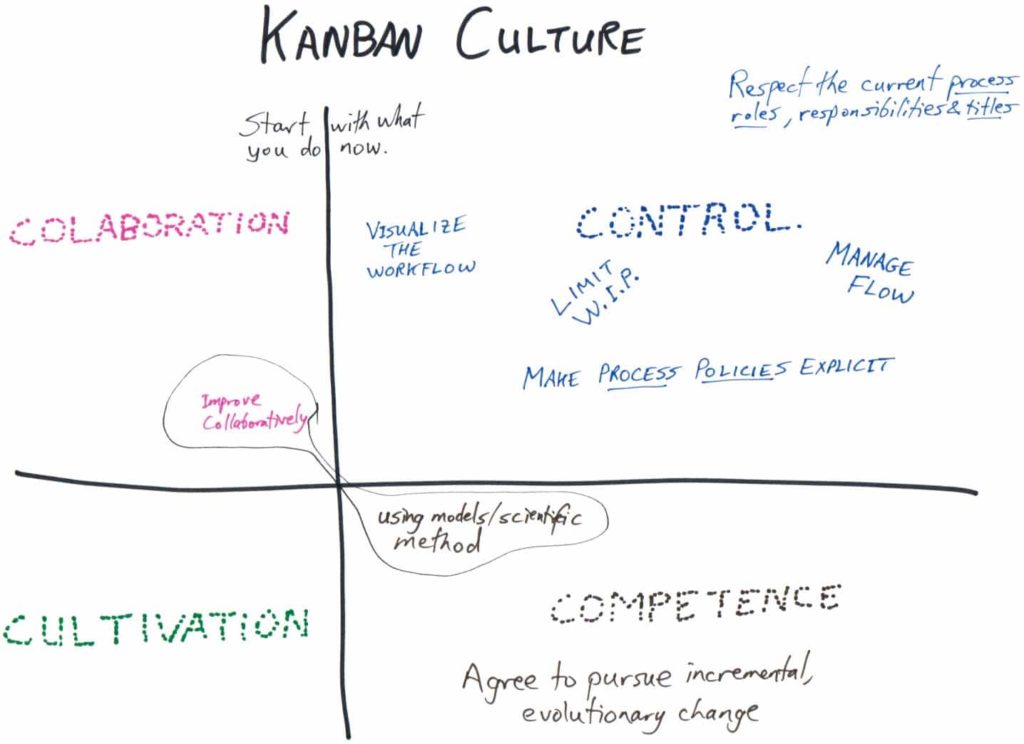In my last post, I looked at how Agile Culture is about Collaboration and Cultivation.
Today, I am likely to ruffle a lot of feathers by observing that Kanban aligns well with control culture. So, if you are a consultant or coach, this is good news since Agile plays badly to companies that have a control culture. I view todays post as a refinement of my earlier post – Scrum or Kanban? Yes! – where I argued that some situations are a better fit for Kanban vs. Scrum.
What is Kanban?
I am choosing a recent and very insightful post by David Anderson – The Principles of the Kanban Method as the basis for my analysis. David is arguable the leader of the Kanban/Software school with his book, very active mailing list and Lean Software and Systems Consortium.
Kanban is mostly aligned with Control Culture
The cultural model used in the analysis below is based on the work of William Schneider. If you are not familiar with it, I suggest you check out my summary of his book. The terms I am using have a very precise meaning, so please refer to this for additional context.

As you can see the main focus is about Control. Control cultures live and breathe policies and process. Kanban has this in spades. Control culture is also about creating a clear and orderly structure for managing the company which is exactly what Kanban is about.
Control cultures focus on the company/system (vs. people) and current state (vs. future state). This is a good description for the starting place for Kanban.
What is really interesting from a cultural analysis perspective is the principle: Improve collaboratively using models and scientific method. These two concepts really don’t mix, so how can this work? According to Schneider, other cultural elements can be present as long as they support the core culture. So having some people focus is fine as long as it supports controlling the work.
The notion of evolutionary or controlled change can also be compatible with a control culture if it is used to maintain the existing organizational structure and hierarchy.
Wait a minute, Kanban is Agile, isn’t it?
Mike Burrow’s made a very influential post: Learning together: Kanban and the Twelve Principles of Agile Software. In it he argues that Kanban satisfies each of the Agile Principles. Now that I am studying this from the perspective of culture, I see that this is in fact not the case or perhaps only weakly the case.
Agile and Kanban for sure share a common community, and many practices may be cross-adopted, however, they are fundamentally promoting different perspectives. Agile is first about people and Kanban is first about the system. Yes, people are important in Kanban too, but this is secondary to the system.
So is Kanban Agile? I used to think so. I don’t any more.
Addendum
This is an update to this post where I need to clarify a few things:
- I love Kanban and think it is great. We need more of it in the world.
- I am not saying people who use Kanban are control freaks or prefer command and control. What I am saying is that if your client has a control culture, then Kanban is a good thing to talk to them about (vs. Scrum).
- I am not saying Kanban is incompatible with Agile. I am saying that they are complementary perspectives.
So What?
You may be burning with curiosity about what the implications of this are. Stay tuned for upcoming posts.


